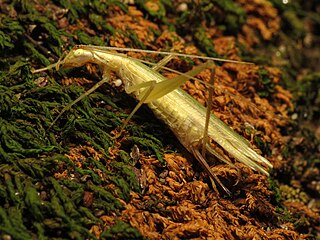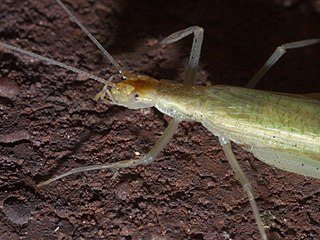
Orthoptera is an order of insects that comprises the grasshoppers, locusts and crickets, including closely related insects such as the katydids and wētā. The order is subdivided into two suborders: Caelifera – grasshoppers, locusts and close relatives; and Ensifera – crickets and close relatives.

The family Gryllidae contains the subfamilies and genera which entomologists now term true crickets. They belong to the Orthopteran subfamily Ensifera, having long, whip-like antennae and has been reduced in terms of the older literature, with taxa such as the spider-crickets and allies, sword-tail crickets, wood or ground crickets and scaly crickets elevated to family level. The type genus is Gryllus and the first use of the family name "Gryllidae" was by Walker.

Dolbear's law states the relationship between the air temperature and the rate at which crickets chirp. It was formulated by Amos Dolbear and published in 1897 in an article called "The Cricket as a Thermometer". Dolbear's observations on the relation between chirp rate and temperature were preceded by an 1881 report by Margarette W. Brooks, although this paper went unnoticed until after Dolbear's publication.

Tree crickets are insects of the order Orthoptera. These crickets are in the subfamily Oecanthinae of the family Gryllidae. This subfamily contains nine genera.

Oecanthus laricis, the laricis tree cricket or tamarack tree cricket, is a species of cricket endemic to the Great Lakes region in the Midwestern United States and Ontario, Canada.

Oecanthus is a genus of cricket in subfamily Oecanthinae, the tree crickets.

Oecanthus pellucens, common name Italian tree cricket, is a species of tree crickets belonging to the family Gryllidae, subfamily Oecanthinae.

Gryllotalpa africana, also known as the African mole cricket, is a relatively small mole cricket species, native to Africa, but local populations exist in Asia, and southern Europe.

Oecanthus nigricornis is a "common tree cricket" in the subfamily Oecanthinae. A common name for O. nigricornis is black-horned tree cricket. It is found in North America.

Oecanthus quadripunctatus is a "common tree cricket" in the subfamily Oecanthinae. A common name for O. quadripunctatus is four-spotted tree cricket. It is found in North America.

Oecanthus exclamationis is a "common tree cricket" in the subfamily Oecanthinae. A common name for O. exclamationis is Davis' tree cricket. It is found in North America.
Oecanthus varicornis, the different-horned tree cricket, is a species of tree cricket in the family Gryllidae. It was described by Francis Walker in 1869 and is found in Central and North America.
Oecanthus argentinus, the prairie tree cricket, is a species of tree cricket in the family Gryllidae. It is found in North America and South America.
Oecanthus pini, the pine tree cricket, is a species of tree cricket in the family Gryllidae. It is found in North America.
Oecanthus californicus, the western tree cricket, is a species of tree cricket in the family Gryllidae. It is found in North America.
Oecanthus celerinictus, the fast-calling tree cricket, is a species of tree cricket in the family Gryllidae. It is found in North America.
Oecanthus rileyi, known generally as the Riley's tree cricket or pine tree cricket, is a species of tree cricket in the family Gryllidae. It is found in North America.

Oecanthus niveus, known generally as the narrow-winged tree cricket or snowy tree cricket, is a species of tree cricket in the family Gryllidae. It is found in North America and the Caribbean.
Liara is an Asian genus of bush crickets in the tribe Agraeciini, belonging to the 'conehead' subfamily Conocephalinae.











